Understanding high mileage and high hours on ATVs and UTVs is crucial to buying or selling a used vehicle. There isn’t an easy answer, so read this post to prepare yourself for a great purchase.
Like cars, ATVs that have been driven more miles have seen more action and have less life left in them, but ATVs and UTVs differ from cars in that you need to know the hours as well as mileage.
The ratio of miles to hours can indicate how the previous owner rode their vehicle, so you need to notice both numbers and compare them. If the ATV has high mileage but a small number of hours, they probably rode very fast and maybe recklessly. You would need to ask them about that. If the ATV has low mileage and many hours, this ATV was probably used for hauling or in tough terrain where their speed had to remain low. How bad that is depends on well the vehicle was maintained.
15 miles to 1 hours is the ideal hours to miles ratio on ATVs.
Truthfully, the most important thing you need to know is how the ATV or UTV was ridden and how it was cared for.
ATVs are intended to last 10 years or 10,000 miles. If they’re well cared for, they might last longer.
How long an ATV actually lasts varies greatly depending on the quality of the vehicle, the way it was ridden, and how it was maintained.
Some are useless after 100 hours, because they were a cheap brand and/or the owner abused or neglected the vehicle. Some can withstand harsh, truly harsh environments.
For hardcore riding, don't forget about your own safety and comfort. Opt for specialized ATV/UTV breathable waders. Multi-layer membrane fabric, extra reinforcement in high-stress areas and dirt-repellent coating are a perfect combo for off-road hazards.
If you’re buying a used ATV, look for brand names you recognize and know are respected.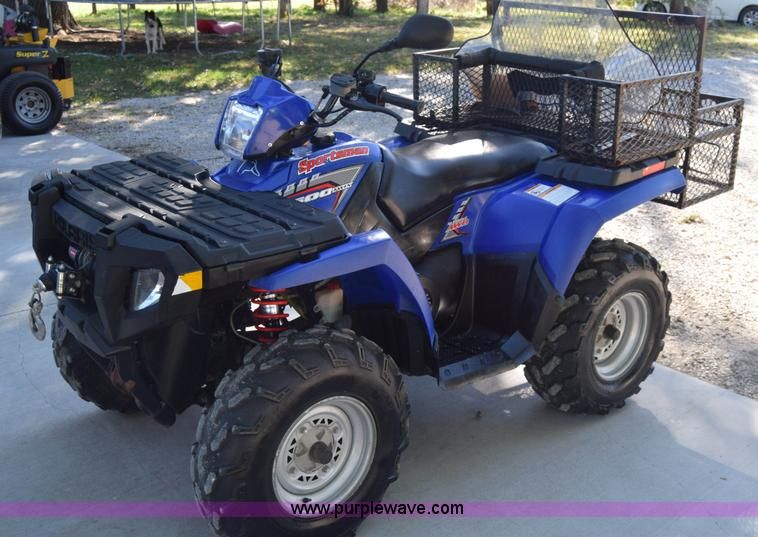 This won’t answer all of your questions because someone can still run a great vehicle into the ground, but it is a crucial indicator of the original quality and expected life span of the vehicle.
This won’t answer all of your questions because someone can still run a great vehicle into the ground, but it is a crucial indicator of the original quality and expected life span of the vehicle.
Off-road will keep you dry and safe in water and mud
Find out the best look for you
This is the most important factor in the life of an ATV or UTV.
Previous owners have to have kept up with recommended service intervals, cleaned the ATV after every ride or weekend of riding, and made all necessary repairs.
Light trail riding, light to moderate farm use, and hunting, camping, or fishing trips fall in the light hours category. This puts little strain on the vehicle, so it will last a longer period of time.
Deep mudding, water use, higher than average speeds, rock climbing, and extreme hauling are hard hours that wear a vehicle out fast. It’s great fun while you’re doing it, but no one should expect these machines to last their full lifespan or to get top prices when they try to sell them.
Proper or improper storage impacts the life of the vehicle. It needs to have been stored indoors and protected from light, pests, and moisture. The area should also have been well-ventilated.
When storing the ATV, the owner should also have been mindful of fluids, tire pressure, and battery tending.
As cool as modifications are, they put a strain on the machine and decrease its lifespan. Take this into consideration when determining the price of a used ATV or deciding whether to purchase it. You should also make sure any modifications were installed correctly.
Thinking strictly of ATV mileage range and hours, 500 or fewer hours is ideal. 5,000 and up is considered high miles for ATVs and UTVs.
But don’t just go for the vehicle with the fewest miles. Consider the age of the vehicle. If someone has owned an ATV and clearly rarely ridden it, it’s unlikely that it’s in great shape after spending that much time in storage.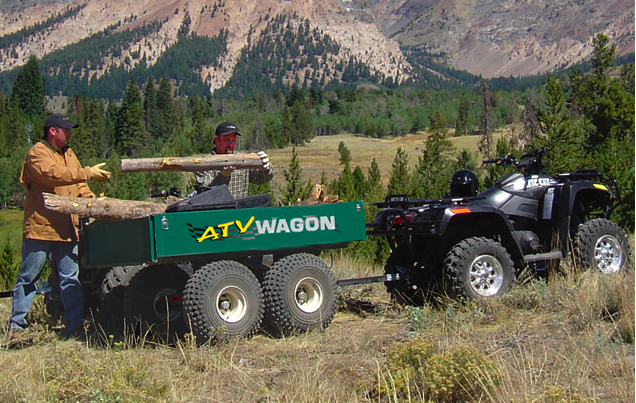 Alternatively, it could tip you off that they’re lying.
Alternatively, it could tip you off that they’re lying.
Follow this plan.
First, ask the owner to make sure not to have the engine running when you arrive and/or notice whether it’s running when you arrive. This is a common tactic to hide that an engine doesn’t want to start.
Next, ask the owner questions about their use of the vehicle, maintenance done on the vehicle, and storage. Consider whether they seem trustworthy.
Ask to inspect the ATV or UTV, and test drive the vehicle.
No reputable seller should mind you taking any of these steps.
Once you know the hours, mileage, and the way the machine’s been cared for, think of the price. If you have the money and the ATV with fewer miles and hours seems like it’s been well cared for, go ahead and pay what seems reasonable. But don’t necessarily rule out buying a high mileage four-wheeler or one that’s done a lot of hours. A properly cared for quality brand of ATV might still be a worthwhile purchase, if it fits those criteria and you don’t spend much on it.
Consider how much is being asked and compare your budget and the likelihood of repairs or replacing it. You can get the best possible deal on a machine needs that some love by buying a salvage ATV. You can expect to probably need to invest in repairs and replacement in the future, but you won’t spend much on it so you can better afford the maintenance and repairs.
Routinely grease the ATV or UTV to protect it from water, dirt, mud, and more.
Clean the ATV or UTV regularly. This means you wash all mud, dirt, and bug parts off of the frame, clean the radiator, and maintain the filters.
Stick to maintenance schedules like your oil and coolant changes.
Make sure you adhere to proper storage procedures.
ENDURO Graphite
the most durable
279 EUR
ENDURO Camogrey
the most durable
279 EUR
-30%
SPEEDMASTER-ZIP Camolightgrey
with central zipper
419 EUR
293. 30 EUR
30 EUR
SPEEDMASTER-ZIP Camoarmy
with central zipper
479 EUR
NEW
SPEEDMASTER Camoarmy
the most advanced
319 EUR
NEW
SPEEDMASTER Camoarctic
the most advanced
319 EUR
HIT
AQUAMASTER Blue
reliability & comfort
299 EUR
HIT
AQUAMASTER Red
reliability & comfort
299 EUR
NEW
SPEEDMASTER Camolightgrey
the most advanced
299 EUR
SPEEDMASTER-ZIP Graphite
with central zipper
479 EUR
Explore all
by Lee
An ATV or Side By Side’s lifespan is 15 to 20 years if you do proper maintenance.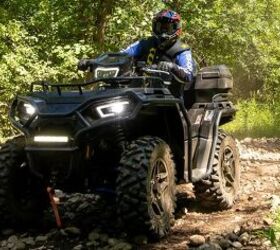
The average miles I expect out of a used ATV is 800 miles a year. So a 5-year-old ATV, I expect to have around 4,000 miles.
Let me explain why I say 15 years max and 800 miles a year for ATVs.
ATVs and side by sides are measured in both mileage and hours.
These two numbers are not a replacement for the other and will often be wildly different, especially across the globe.
Mileage and hours on an ATV can tell you a lot about them.
If you see an ATV with high mileage, but low hours it tells us they like to drive it fast. Not always an issue because this is normal when riding in the dunes but a huge red flag if taken to the extreme.
If you see an ATV with low mileage and high hours, it tells us they do more trail riding or are hunters. It could also mean they do a lot of snow plowing if they live where it snows a lot.
The average rider puts 800 miles on their ATV or side by side every year.
These numbers can vary a lot, especially on who drives the ATV and where.
An ATV is the primary source of transportation in some countries and small cities, and seeing 30,000+ miles is not crazy. Also, the farmer who uses his side-by-side daily for work will have a lot more hours than the guy who rides on the weekends.
But my baseline is 800 miles a year when I’m looking to buy a used ATV.
| Years | Miles |
|---|---|
| 1 | 800 |
| 2 | 1600 |
| 3 | 2400 |
| 4 | 3200 |
| 5 | 4000 |
| 6 | 4800 |
| 7 | 5600 |
| 8 | 6400 |
| 9 | 7200 |
| 10 | 8000 |
| 11 | 8800 |
| 12 | 9600 |
| 13 | 10400 |
| 14 | 11200 |
| 15 | 12000 |
This means if the ATV is 5 years old, I expect it to have around 4,000 miles on it. It’s when the miles vary from this baseline that I worry. A 5-year-old ATV with only 80 miles on it screams trouble, along with one having 80,000 miles on it.
It’s when the miles vary from this baseline that I worry. A 5-year-old ATV with only 80 miles on it screams trouble, along with one having 80,000 miles on it.
What matters more than hours or miles is how well the ATV was taken care of. Don’t let high miles keep you from an ATV that was properly maintained!
Average miles per year = 800 miles.
Max years for an ATV = 15 years.
800 miles * 15 years = 12,000 miles
I consider 12,000 miles a lot, especially if the ATV is under 15 years old.
Why 15 years? The manufacturer stops making vital parts for ATVs after that point. An ATV can go forever if you can get the parts, but a lot is discontinued after 15 years, and no point in keeping it going if you can’t work on it.
Would I buy an ATV with a lot of miles? Probably, it depends on how well it was taken care of. Let me explain.
I’ve seen guys with high mileage and high hours have no issues and keep trucking along.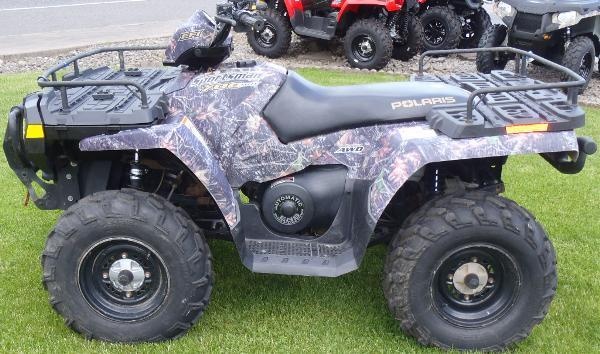
I’ve also seen guys with low mileage and low hours and not take care of their ATV, and it turns to crap.
What matters the most is checking the ATV out in person and not some numbers anyone can screw with.
I had one guy try to sell me a limited-edition Can-Am Outlander 1000 with low hours and miles. The deal seemed too good to be true, and it was. When I looked at the ATV, I could tell the frame had bad cracks. This ATV was in a bad accident, and I later found out the dude rolled it down a mountain. The dude spent a lot of money to get new plastics and was trying to pass it off to someone else.
This is why mileage and hours are secondary to actually checking the ATV out in person.
I rather have an ATV with a lot of miles on it but taken care of than one with low miles and left to rot. A high mileage ATV tells me that the previous owner liked the quad and didn’t seem to have much trouble getting to those high miles; less likely to be a lemon that someone is trying to push on to someone else!
I hate this question because I’m a Can-Am guy, so naturally, I want to say Can-Am.
I’m sure a Yamaha or Honda guy will say the same thing.
But I will give it to Honda; they got it figured out and make some of the best engines. They lack in tech where Can-Am over-delivers, but I’ve seen 20-year-old Hondas still going to this day.
Since Honda is slower to change, this helps keep their ATVs going for longer. Many of their parts for older models are still around. I have a 1999 Can-Am Traxter that would still run if I could get a discontinued part. This is what decides how long your ATV last, not the hours or the mileage.
Unless you love going mudding and know what you’re doing, avoid the mud machines.
That is the XMR’s and other brands that come from the factory with a snorkel and are “mud ready.” Or the guys who convert their stock ATV to a mudding one.
These ATVs don’t have much of a warranty and are rode very hard. It’s not uncommon for them to get hydro locked due to mud and water getting in the engine and intake.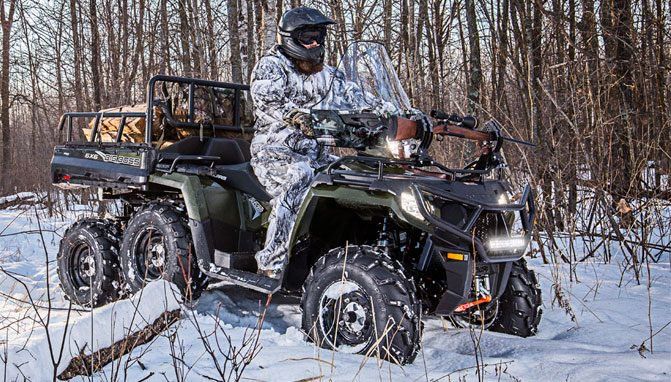 Water in the engine can bend piston rods and blow the engine.
Water in the engine can bend piston rods and blow the engine.
Mudding ATVs are taken apart and tore down often due to them getting submerged in water and mud all the time.
I love going in the mud and getting crazy, but that is not the problem; the problem is the guys who take their ATVs and put them entirely underwater. Those are the ATVs to avoid as those things develop phantom issues eventually.
Not all mud machines are bad, but this ATV Mud Machine below is not one I would buy secondhand.
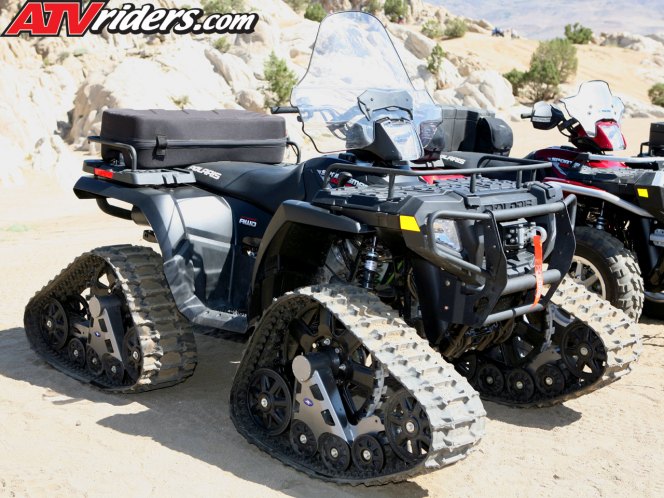
3-Day Delivery
All the most powerful performance and the smoothest ride of an all-rounder Sportsman for comfortable travel alone or with friends.
Free delivery in Moscow and the region
Extended pre-sale preparation0020
2022 Polaris Sportsman XP 1000 Hunt Edition - Polaris Pursuit Camo quantity
952cc SM engine 9000,9,0002 Via group or alone.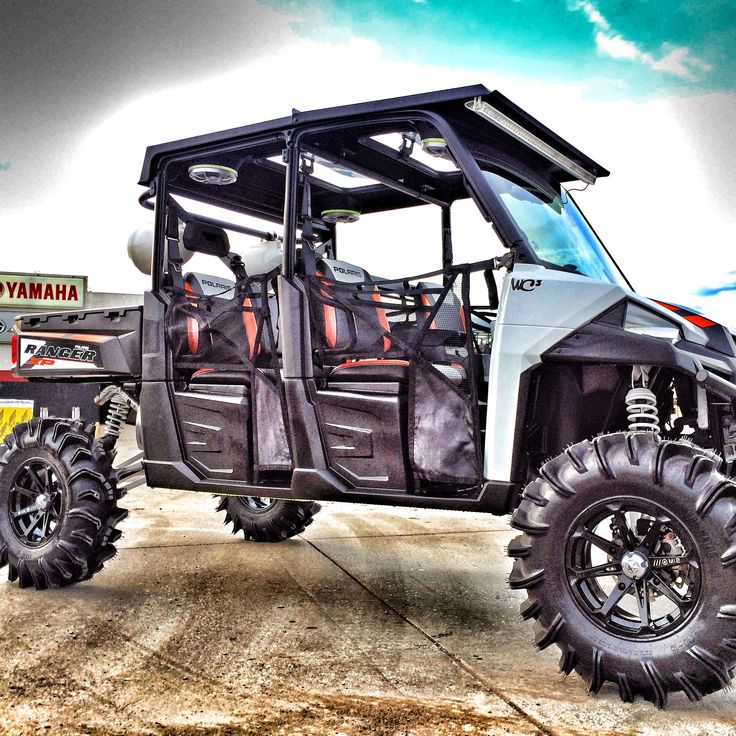 The versatile Sportsman models are equipped with powerful performance and driving performance.
The versatile Sportsman models are equipped with powerful performance and driving performance.
Clever aerodynamic air flow under the underbody ensures comfort, coolness and silence when riding. And the rear suspension travel of 24.1 cm ensures a smooth ride, on any track.
The industry's fastest automatic all-wheel drive system allows you to confidently overcome any obstacle, even if it's rock and boulders.
Factory-fitted with an 8-litre storage compartment and a third headlight, you can travel long distances with confidence.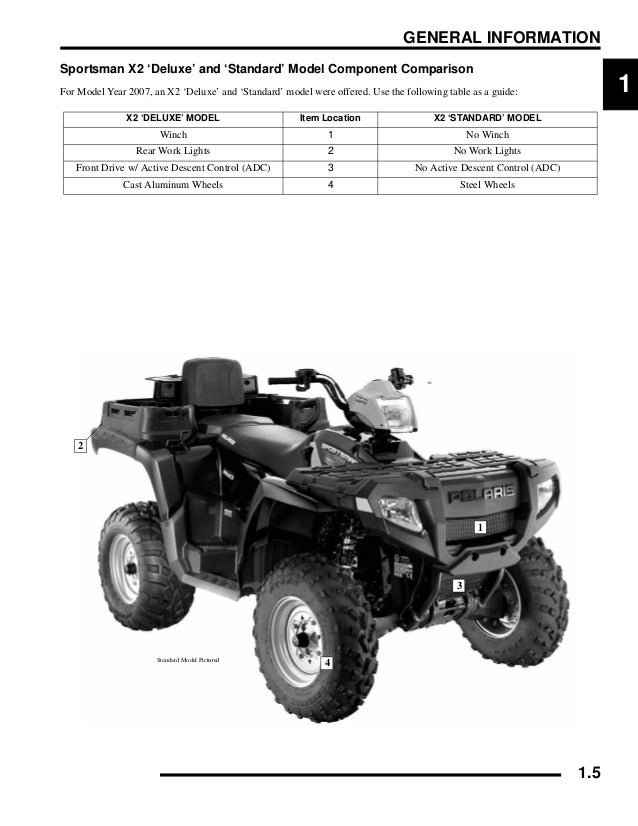
| Model Year | 2022 |
|---|---|
| Downhill assistance | Yes |
| Cooling | Liquid |
| Engine size | 952 cc see |
| Drive | AWD/2WD |
| Engine braking (EBS) | Standard |
| Engine type | 4-stroke DOHC Two-cylinder ProStar |
| Fuel system | Electronic Fuel Injection (EFI) |
| Power | 90 l. |
| Transmission | Automatic linear shift PVT P / R / N / L / H |
| Weight | 402 kg |
| Fuel tank capacity | 19.9 l |
| Height | 128.9 cm |
| Length | 211.4 cm |
| Width | 120.9 cm |
| Seats | 1 |
| luggage compartment | No |
| Load capacity | 261 kg, 55 kg (front deck) / 110 kg (rear deck) |
| Clearance | 29 cm |
| Seat height | 94 cm |
| Wheel base | 134.6 cm |
| Brake system | 4 wheel hydraulic disc (manual) with hydraulic rear foot brake |
| Parking brake | Park gear / Fixed handbrake |
| Seat adjustment | No |
| Mounting system | Lock & Ride System, 15L Front Dry Boot, 8L Under-Rear Boot |
| Suspension control | No |
| Front suspension type | Sealed double A-arms |
| Front suspension travel | 22. |
| Traction force | 680 kg |
| Tow bar type | Standard 1.25" (3.2 cm) |
| Lighting | LED Steering Light, LED Headlights, Dual LED Brake/Driving Lights, Tail Light for Work |
| Rear suspension type | Sealed Angled Double A-arm, Rolled IRS |
| Rear suspension travel | 26 cm |
| Seat | with stitching |
| Steering column adjustment | No |
| Winch | Polaris Pro HD 3,500 lb. with synthetic rope |
| Electronic power steering | Multi Select EPS |
| Front wheels | 26" x 8" PXT |
| Rear wheels | 26" x 11" PXT |
| Wheels | 14", Cast aluminum |
| Color | Polaris Pursuit Camo |
3-Day Delivery
All the most powerful performance and the smoothest ride of our versatile Sportsman models for comfortable travel alone or with friends.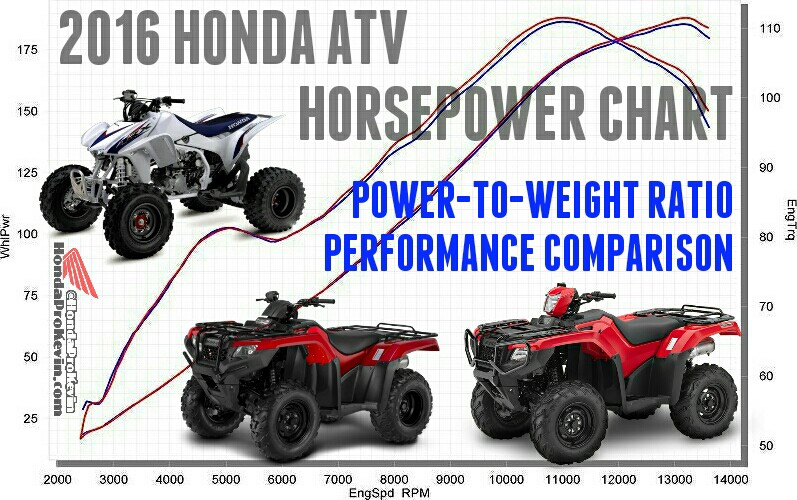
Free delivery in Moscow and the region
Extended pre-sale preparation
8(495) 133-94-92
Our showroom address
1562000 ₽ 9002 2022 Polaris Sportsman 570 Hunt Edition - Polaris Pursuit Camo quantity 567cc cm displacement 392.8kg weight 128.3cm wheelbase Review of the ATV Polaris Sportsman 570 Hunt Edition - Polaris Pur Camsuito
All the most powerful performance and the smoothest ride of our versatile Sportsman models for comfortable travel alone or with friends.
The well-designed aerodynamics of the airflow under the underbody ensures comfort, coolness and quietness when driving.
And 24.1 cm of rear suspension travel ensures a smooth ride, on any trail.
The industry's fastest automatic all-wheel drive system allows you to confidently overcome any obstacle, even if it's rock and boulders.
Factory-fitted with an 8-litre storage compartment and a third headlight, you can travel long distances with confidence.
| Model year | 2022 |
|---|---|
| Downhill assistance | Yes |
| Cooling | Liquid |
| Engine size | 567 cc see |
| Drive | High Performance AWD/2WD |
| Engine braking (EBS) | Standard |
| Engine type | Prostar, 4-stroke, SOHC, single cylinder |
| Fuel system | Electronic Fuel Injection (EFI) |
| Power | 44 HP |
| Transmission | Automatic linear changeover PVT P / R / N / L / H |
| Weight | 319. |
| Fuel tank capacity | 17 l |
| Height | 119.4 cm |
| Length | 210.8 cm |
| Width | 121.9 cm |
| Seats | 1 |
| Luggage compartment | No |
| Load capacity | 220 kg |
| Clearance | 29 cm |
| Seat height | 84.5 cm |
| Wheel base | 128.3 cm |
| Brake system | 3-wheel hydraulic disc (manual) with hydraulic rear foot brake |
| Parking brake | Park gear / Fixed handbrake |
| Seat adjustment | No |
| Mounting system | Lock & Ride System, 19L Front Dry Rack, 8L Underseat Rack |
| Suspension control | No |
| Front suspension type | McPherson |
| Front suspension travel | 20. |
| Traction force | 612 kg |
| Tow bar type | Standard 1.25" (3.2 cm) |
| Lighting | Halogen headlamps and steering lamps, Triple High Beam 50 W, Dual Low Beam 50 W, Dual LED Brake/Driving Lights |
| Rear suspension type | High Clearance Arched Double A-arm, Rolled IRS |
| Rear suspension travel | 24.1 cm |
| Winch | Polaris Pro HD 2,500 lb. with steel cable |
| Steering column adjustment | No |
| Front wheels | 25×8-12 P373; 6 PLY |
| Rear wheels | 25×10-12 P373; 6 PLY |
| Wheels | Stamped steel |
| Color | Polaris Pursuit Camo |
| Basic | Full digital gauge, speedometer, odometer, tachometer, dual trip meters, hour meter, gear indicator, fuel gauge, four wheel drive indicator, voltmeter, coolant temperature, high temperature light. |